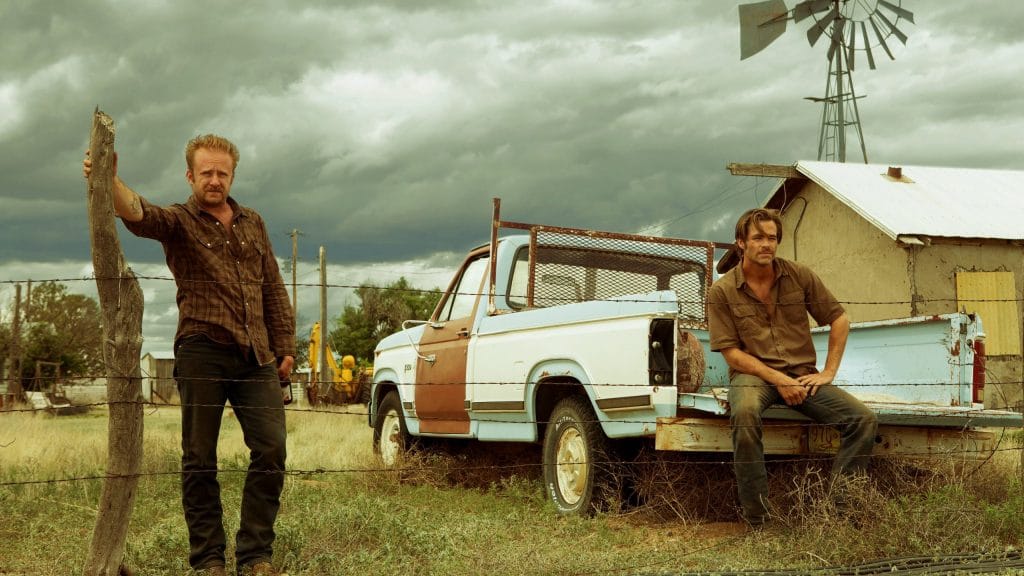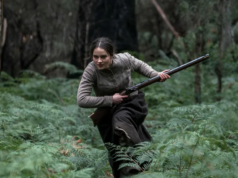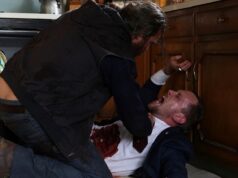With intense performances from its great cast, David Mackenzie’s neo-Western is an effective combination of adrenaline, humor and melancholy
Hell or High Water (2016)
Directed by David Mackenzie. Written by Taylor Sheridan. Starring Jeff Bridges, Chris Pine, Ben Foster, Gil Birmingham, Marin Ireland, Katy Mixon, Dale Dickey, Kevin Rankin, Melanie Papalia, John Paul Howard, Christopher W. Garcia and Margaret Bowman.
At a certain moment in Hell or High Water, the half-Indian, half-Mexican Texas Ranger Alberto Parker (Gil Birmingham) gives a brief monologue about how the land of West Texas used to belong to his Comanche ancestors until the grandparents of the white folks who live there came and took it. “And now it’s been taken from them. Except it ain’t no army doing it, it’s those sons of bitches right there,” he says, pointing at the Texas Midlands Bank. It is a beautiful moment that makes it clear who the villains are and lets us sympathize even more with a pair of bank robbers. And the fact that this thought-provoking neo-Western boasts a hilarious sense of humor, great performances and priceless dialogue is a bonus.
The two bank robbers in question are brothers Tanner Howard (Ben Foster), who has just gotten released from prison, and Toby Howard (Chris Pine), an unemployed and divorced father who is desperate to save his family’s ranch, which is about to be foreclosed by the Texas Midlands Bank unless he finds a way to pay off a reverse mortgage debt in a few days. Toby wants to leave the real estate to his children since oil has recently been discovered in the land, but the way he has come up with to raise the money is robbing branches of the Texas Midlands Bank. Meanwhile, Texas Rangers Marcus Hamilton (Jeff Bridges), who is close to retirement, and his partner Parker are assigned to the case and try to anticipate what the brothers will do next.
The script written by Taylor Sheridan (Sicario) is perfect material for these actors to show their talent. Filled with darkly humorous exchanges of dialogue, Hell or High Water is structured around the relationships between the brothers (with their striking differences in personality) and that between the Rangers, who couldn’t be more dissimilar and yet manage to get along in their own peculiar way. It is a pleasure to see the Howards interacting with each other as they bury stolen cars in the middle of nowhere or talk about their family issues, and the same can be said about how Hamilton and Parker spend most of the film bickering with racist slurs like only people who know each other for a long time could do.
As the brothers move on to find new banks and the Rangers track them down, Hell or High Water unfolds like an authentic road movie, with stops along the way that include an Oklahoma casino (the stolen money needs to be laundered) and a diner where a waitress practically tells the cops what they must and must not order — a hilarious moment in which we get to hear a sentence like “I’m hot, and I don’t mean the good type.” The plot also becomes more nuanced when we see how protective the Howards can be of each other whenever they come across other people or when it becomes clear that this is not a classic Western with easily distinguishable good and bad guys. Like in real life, things are more complicated.
Pine and Foster do an excellent job playing two three-dimensional characters who struggle against an unfair system that favors greedy bankers. Violent and explosive, Tanner wants to help his brother just because he asked him, even knowing that this could throw him back into jail, and Foster’s combination of intensity and charisma helps us sympathize with him all the way. Toby, on the other hand, has a clean record and feels hesitant to engage in violence (notice his concerned look when Tanner becomes too aggressive in the film’s first scene). But that is, unless his brother and his family are in danger, and Pine always makes us believe that Toby would do anything to help those he loves to stay away from poverty.
Still, it is Jeff Bridges who steals the scene every time he appears. Playing an eccentric character not so different from the ones that earned him so much praise in Crazy Heart (2009) and True Grit (2010), he pulls off his good old shtick and composes Hamilton as a rude Southern Ranger of sharp tongue who sounds like he is chewing a potato when he speaks. This may be too familiar and more of the same, but it works, especially considering that his comic timing is impeccable as usual. Closing the cast, Gil Birmingham offers a nice and sober balance to Bridges’ larger-than-life persona, displaying a very nice chemistry with him as well and offering us the beautiful monologue I mentioned in the beginning of this text.
Even more interesting is how the film shows that a lot of people are willing to risk their lives for a bank, like in a tense and skillfully directed robbery scene that takes place later on. It is hard not to scratch our heads in disbelief at so many unnecessary deaths, with people fighting hard to protect an institution that has so much money that a mere heist wouldn’t cause any damage to it. The truth is, when someone raises hell and disrupts the “natural” balance expected in society, there are always those who will step up for what is “right.” Hell or High Water exposes this conundrum and questions the very concepts of “right” and “wrong,” leading us to an amazing standoff between the righteous and the underdog in the end.
With a superb sound design and a lot of adrenaline in the car chase scenes, Mackenzie creates a thrilling film that surprises us with an underlying touch of sadness — and Giles Nuttgens’ cinematography, which explores the dusty dryness of the desert, and the melancholy music by Nick Cave and Warren Ellis really add to that. For no matter how exhilarating or funny Hell or High Water is, the fact is that this is a tragic tale of men trying to survive an unfair capitalist system and an ugly cycle of poverty that runs in their family from generation to generation like a disease. And for that reason, it stands out as a great entry in the genre.





